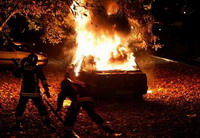Police patrol Paris' troubled suburbs
Paris police watch for rioters who have torched buildings and cars in three nights of unrest. And President Nicolas is going to punish youths who shot at police.

The violence appeared to be ebbing, and there were no incidents reported in the first hours after nightfall Wednesday. Sarkozy - keen to show things are under control - said rioters who fired at officers with shotguns earlier this week were guilty of attempted murder.
Youths who used firearms "will find themselves in a criminal court," Sarkozy said. "That has a name, it is a murder attempt."
Ten officers were injured by buckshot and pellets at the peak of violence Monday, national police have said. Police unions had higher figures, at about 30 officers. Prosecutors said they had opened a preliminary inquiry for attempted homicide in the cases.
The unrest has drawn comparisons to riots that raged through poor suburbs nationwide for three weeks in 2005, and it shows that anger still simmers in poor housing projects where many Arabs, blacks and other minorities live, often isolated from mainstream society.
The rough suburbs are shaky ground for a president who has confidently tackled striking rail workers and sticky diplomatic situations but is unwelcome in poor French housing projects where his hard line on crime and immigration has riled many residents.
As interior minister just before the 2005 riots, Sarkozy called troublemakers in the suburbs "scum." During his election campaign early this year, Sarkozy deftly avoided such neighborhoods, except for one carefully orchestrated blitz visit.
On Wednesday, Sarkozy described the incident that sparked the latest violence - the deaths of two teenage boys on a motorbike Sunday in an accident with a police car in the Paris suburb of Villiers-le-Bel - as "distressing."
But he insisted that was no excuse for the ensuing mayhem.
"So that things are very clear: What has happened is absolutely unacceptable," Sarkozy said after meeting with a police captain hospitalized in Eaubonne north of Paris. Sarkozy arrived straight from the airport after returning from a trip to China.
Later the president met with families of the two teens and told them a judicial inquiry had been opened into the deaths, their lawyer, Jean-Pierre Mignard, said.
The inquiry will allow the parents to "participate actively in finding out the truth. Nothing will be hidden," Mignard said.
Questions about the circumstances of the accident triggered the rioting in working-class Villiers-le-Bel. The belief that police were at fault prompted rioters to burn down a library, preschool and several stores earlier this week.
A prosecutor has said the officers did not appear to have caused the crash, though officials are investigating nonetheless.
The issue is sensitive, as there are long-standing tensions between France's largely white police force and ethnic minorities in poor neighborhoods. Youth anger has focused on police, as it did in 2005. That violence also started in the suburbs of northern Paris, when two teens were electrocuted in a power substation while hiding from police.
Successive governments have struggled with the question of how to integrate minority youths from poor neighborhoods into French society. Heavy state investments have done little to improve housing and create jobs in the depressed projects that ring Paris.
The government's newest plan - an "equal opportunities" bill to improve the prospects of those in poor suburbs - will be unveiled Jan. 22 as planned, France's government spokesman Laurent Wauquiez said.
"The goal is not to spend billions once again," he said, but to solve problems, such as ensuring job opportunities for youths and access to public transit in poor neighborhoods.
Though still tense, Tuesday night was quieter than the previous nights. National police said a few officers were lightly injured.
Patrice Ribeiro of the Synergie police union put the figure at 20 - down from more than 80 the night before. Youths lobbed Molotov cocktails and stones at police in Villiers-le-Bel but no firearms were used Tuesday, he said.
About 138 cars around France were burned overnight Tuesday-Wednesday, which Ribeiro called almost "normal." Police say as many as 100 cars are burned every night around the country.
Interior Minister Michele Alliot-Marie said Wednesday that 39 people were arrested Tuesday night but that the overall situation was calm. She said on Europe-1 radio that police presence would remain reinforced "as long as necessary."
Subscribe to Pravda.Ru Telegram channel, Facebook, RSS!





